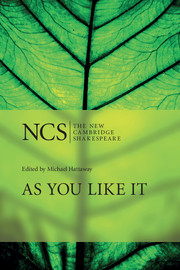Book contents
- Frontmatter
- Contents
- List of Illustrations
- Preface to the Updated Edition
- List of Abbreviations and Conventions
- Introduction
- Note on the Text
- As You Like It
- List of Characters
- The Play
- Textual Analysis
- Appendix 1 An Early Court Performance?
- Appendix 2 Extracts from Shakespeare’s Principal Source, Lodge’s Rosalind
- Appendix 3 The Songs
- Reading list
Preface to the Updated Edition
- Frontmatter
- Contents
- List of Illustrations
- Preface to the Updated Edition
- List of Abbreviations and Conventions
- Introduction
- Note on the Text
- As You Like It
- List of Characters
- The Play
- Textual Analysis
- Appendix 1 An Early Court Performance?
- Appendix 2 Extracts from Shakespeare’s Principal Source, Lodge’s Rosalind
- Appendix 3 The Songs
- Reading list
Summary
The popularity of As You Like It over the last 260 years has generated a myriad of productions. There are not as many editors, but their accumulated industry means that each successor can make only a modest contribution to what has been revealed and explained. It is therefore appropriate to begin with a tribute to my predecessors, especially H. H. Furness, whose acute common sense shines through the verbosities that convention dictated he transcribe in the notes to the first New Variorum edition (1890), to his successor, Richard Knowles, whose revised work in the same series (1977) is magnificently full, sagacious, and accurate, to Alan Brissenden, who generously offered encouragement just after his own Oxford edition had appeared (1993), and to Juliet Dusinberre whose Arden 3 edition (2006) prompted a deal of revision in this second edition (see, especially, Appendix 1). This volume is supported by recent encyclopaedic works of reference: Stanley Wells and Gary Taylor, William Shakespeare: A Textual Companion, 1987, Kenneth S. Rothwell and Annabelle Henkin Melzer (eds.), Shakespeare on Screen: An International Filmography and Videography, 1990, and Bryan N. S. Gooch, David Thatcher, Odean Long (eds.), A Shakespeare Music Catalogue, 5 vols., 1991. James L. Harner's online World Shakespeare Bibliography, together with the Oxford English Dictionary, Literature Online, Early English Books Online, and the visual riches of Designing Shakespeare, produced under the aegis of the Arts and Humanities Data Service (UK), not only enable an editor to move more swiftly and with more assurance, and support scholars and students taking up the references that derive from them, but also will serve to expose the lacunae that any editor knows dot the surface of her or his endeavours. Conversely, for much of what had to be imported into earlier editions – analogous word usages, dutiful accounts of run-ofthe- mill productions, transcriptions of song settings not associated with the earliest performances – the curious reader can be directed to these great repositories. These add to the earlier works, George C. D. Odell's Shakespeare from Betterton to Irving, 2 vols., 1920, for example, upon which we all relied so much.
- Type
- Chapter
- Information
- As You Like It , pp. vii - viiiPublisher: Cambridge University PressPrint publication year: 2009

